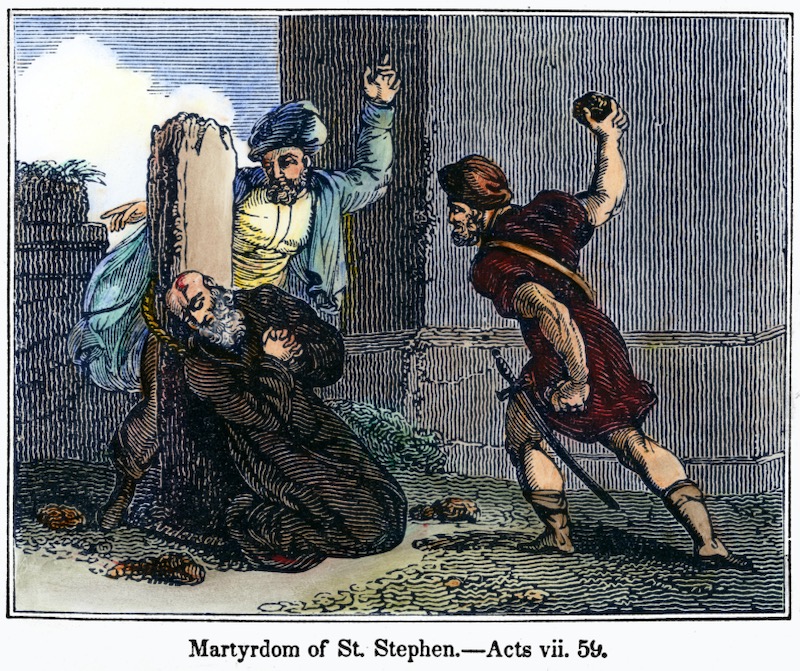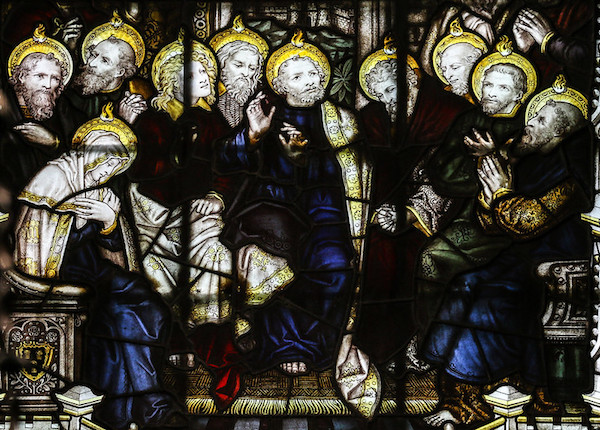When we say in the Creed, “I believe in the Holy Spirit”, we’re articulating not just one of the things we, as Christians, believe, but a truth that is presupposed to everything we believe.
And yet, though our belief in the Holy Spirit appears in the most ancient of all the formal creeds, the Apostles’ Creed, it wasn’t until the end of the fourth century that a full article explicating what we believe about the Holy Spirit appeared in the Creed we now most often use at Mass, the Niceno-Constantinopolitan Creed.
That time gap between the events described in today’s reading from the Acts of the Apostles and the fuller explication of what was believed about the Holy Spirit reminds us that, just as God revealed himself in time, so the saving truths of faith come to us through time: and they come to us through the presence and work of the Holy Spirit. Jesus said explicitly that he was sending us the Holy Spirit precisely to bring to our minds all that he has taught us: “I will send the Spirit of truth, who will teach you all truth”.
Hence, it took time for the Church to understand that our communion with God and one another – friendship, in other words – is made possible precisely through the gift of the Holy Spirit. It follows from the fact that he is the love that unites the Father and the Son, that he is also the love that unites us to the Father and the Son, and the love that unites us to one another. That’s why any experience of genuinely selfless love leads us directly into the mystery of God, who is Love Itself. Ubi caritas et amor, Deus ibi est.
It also reminds us that the truths given to us in faith here on earth under the guidance of the Holy Spirit will be forever unfolding. Though the teaching of the Church most certainly points us authoritatively in the direction of the Truth, no formulation of the faith could ever exhaust the Truth. God remains permanently beyond the reach of our language and the grasp of our intellects, beyond, that is, anything we can ever say or think. And yet, for all our ‘unknowing’, the Holy Spirit is more intimately and more inwardly present to us than we are to ourselves. He is the indwelling of God, the light by which we see and the love by which we live.
The actual events of Pentecost also have much to teach us. It’s often spoken of as Babel reversed. If the cacophonous babble of the Tower of Babel in the book of Genesis represented the fragmentation rather than the uniting of the human race by language, the reversal at Pentecost was represented by the fact that everybody to whom the apostles preached understood what they had to say, not, the text is at pains to say, in the same language, but in their own language; not in one, common language, but in many, diverse languages.
What they experience is the same truth, expressed in many, different languages. Diversity is preserved, in other words, not suppressed: diversity in unity and unity in diversity is the distinctive gift of the Spirit, who as the Love that exists between the Father and the Son, affirms and nurtures, as does all genuine love, rather than subverts, diversity. Both diversity and unity are God-given, defining characteristics of our humanity, intrinsic to our very being, made as we are in the image and likeness of God, the Blessed Trinity.
The raw human experience of the first disciples at Pentecost also has much to teach us. Ever since Jesus had been physically removed from them, the Apostles and the others had been reduced to a timid, self-protective huddle, locked away in an upper room, wishing that things had turned out differently, looking to the past and longing to have their old lives back. But the gift of the Holy Spirit transformed their paralysing reticence and debilitating nostalgia: once fearful, they were now fearless; once silent, they now couldn’t stop talking.
The text is explicit: they were like men “drunk on young wine”, a sentence inexplicably and somewhat squeamishly omitted from today’s reading. These diffident, regretful, bowed individuals, now burst forth from the upper room, changed beyond all recognition, alive in the Spirit.
That state of paralysis is all-too-familiar. Feeling powerless to bring about the changes we yearn for, we often fall into the trap of putting our lives ‘on hold’, waiting for that ‘something more’ that will make the crucial difference; and, as a consequence, we miss here and now myriad movements and promptings of grace, enabling what we cannot of ourselves achieve. What Pentecost powerfully reminds us of is that the really important changes in our lives come, not from outside of ourselves, but from within, from the Holy Spirit, ‘the Lord, the Giver of Life’, who is permanently present to and with us.
But God is infinitely courteous: he invites our consent. To use a modern metaphor: the programme is already downloaded and installed, it needs only our consent to be activated. So, when we pray to the Holy Spirit, we’re acknowledging his presence and power in the depths of our being and consenting to ‘activation’, our coming alive in the Spirit.
“Come, O Holy Spirit, fill the hearts of your faithful, and enkindle within us the fire of your love.” That enkindling is the decisive and defining change that changes everything.



 Loading ...
Loading ...
What do you think?
You can post as a subscriber user ...
User comments (0)